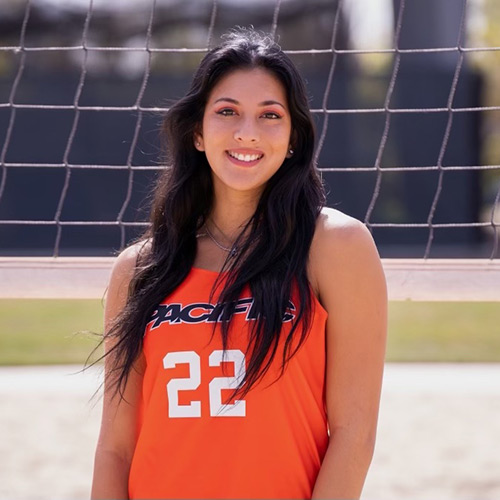About Hania:

I am a sophomore D1 Beach volleyball player and team captain at University of the Pacific. In 2021, I started a mental health awareness club on campus called Breaking Barriers. Our mission is to get rid of the stigma towards mental health/illnesses while simultaneously giving our athletes a platform to share their voices and empower each other as a community.
When I was 6 years old my dad, who was bipolar, died by suicide. I struggled with depression and grief. Then, when I was a senior in high school, my male therapist who was a father figure to me, also died by suicide.
After the loss of these two loved ones to their battle with mental illness, I decided I needed to be the voice of people like them. I created Breaking Barriers and am majoring in psychology because I want to help people like my dad, therapist, and those like me, who have lost a loved one to this battle of silence.
HOW HAS SUICIDE AFFECTED YOUR LIFE?
Losing my dad and my therapist to suicide, at such a young age especially, has truly driven me towards fighting for change. I had to grow up faster than most and grasp the idea of death at such a young age. I think watching those I love suffer in silence is the sole reason I have gained my voice. If I had not grieved properly and faced this terrible loss, I am unsure that I would have gained the courage to advocate for mental health awareness because it is an extremely hard thing to do.
WHAT ARE SOME OF THE EMOTIONS YOU FELT AFTER LOSING IMPORTANT MEN IN YOUR LIFE?
My emotions after losing my father were extremely up and down throughout the years. Being 6 years old when it happened, I felt confusion, panic, and at some points denial. Over the years, the sadness, loneliness, heartbreak, and most of all guilt and blame, took over me. I struggled with abandonment issues and oftentimes blamed myself and wondered why I wasn’t good enough, despite my fathers death having nothing to do with me.
When I lost my therapist, the feelings I had just learned to grow from seemed to resurface all over again. I was in disbelief when I lost my therapist as he was so strong, inspirational, and advocated for me at all times. It truly taught me that no matter how strong someone seems, they may be struggling too, and you never know what goes on behind closed doors.
HOW DID STARTING YOUR MENTAL HEALTH AWARENESS CLUB FACTOR INTO IMPROVING YOUR MENTAL HEALTH?HOW DO YOU ENVISION IT SUPPORTING OTHERS WHO MAY BE IN A SIMILAR POSITION TO YOU?
Starting Breaking Barriers has taught me how to have uncomfortable conversations with people my age every single day because it is necessary to break the stigma. At first, I felt awkward and vulnerable but I believe that I have now created a space where people feel valued and heard.
Creating this club has become a part of my healing process because it allows me to feel that I am helping my dad and therapist through the lives of others. It has allowed me to expand my education on mental health as well as helped me to understand what leads people to feel isolated and what I can do to change that.
I believe taking initiative to start even the tiniest bit of awareness for mental health can help release a lot of the negative emotions that others like me may hold. I envision this club revealing to others that they are not alone in what they are struggling with and that so many peers are willing to listen if given the opportunity.
HOW DID YOUR INVOLVEMENT IN SPORTS IMPACT YOUR MENTAL HEALTH?
In the past, I had utilized volleyball as a distraction for my mental health and I began to prioritize my sport before my emotions because it felt easier. However, after starting my healing journey and progressing into collegiate level athletics, volleyball has strengthened my positive mindset, taught me how to be a leader which has given me a chance to advocate for change, and provided an environment where I can express myself within a safe program and among trusted peers.
WHAT ARE THREE THINGS THAT HAVE HELPED YOU MOVE FORWARD WITH YOUR LIFE?
Three things that helped me move forward with my life are writing poetry/journaling, finding peace and grounding within the earth (especially the ocean), and learning to be honest about my emotions to my friends, family, and myself.
WHAT WOULD YOU TELL SOMEONE WHO HAS LOST A CLOSE FRIEND OR FAMILY MEMBER TO SUICIDE?
I know it is difficult to see but there is always hope, hope that it does get better. Grieving and growing is a journey, some days are better than others and it is never-ending. Take it day by day and let those who love you in during this time of need. Those you have lost will forever live in your heart, but will not break it forever.
One thing I want you to know is that it is not your fault. If you live with that blame, it will eat you alive. Whatever feelings you feel are valid but please do not blame yourself, it is not your fault. There are many resources out there to help you and I am here to listen if you ever need.
– Hania Taduran, Sophmore Beach Volleyball player at University of the Pacific 

